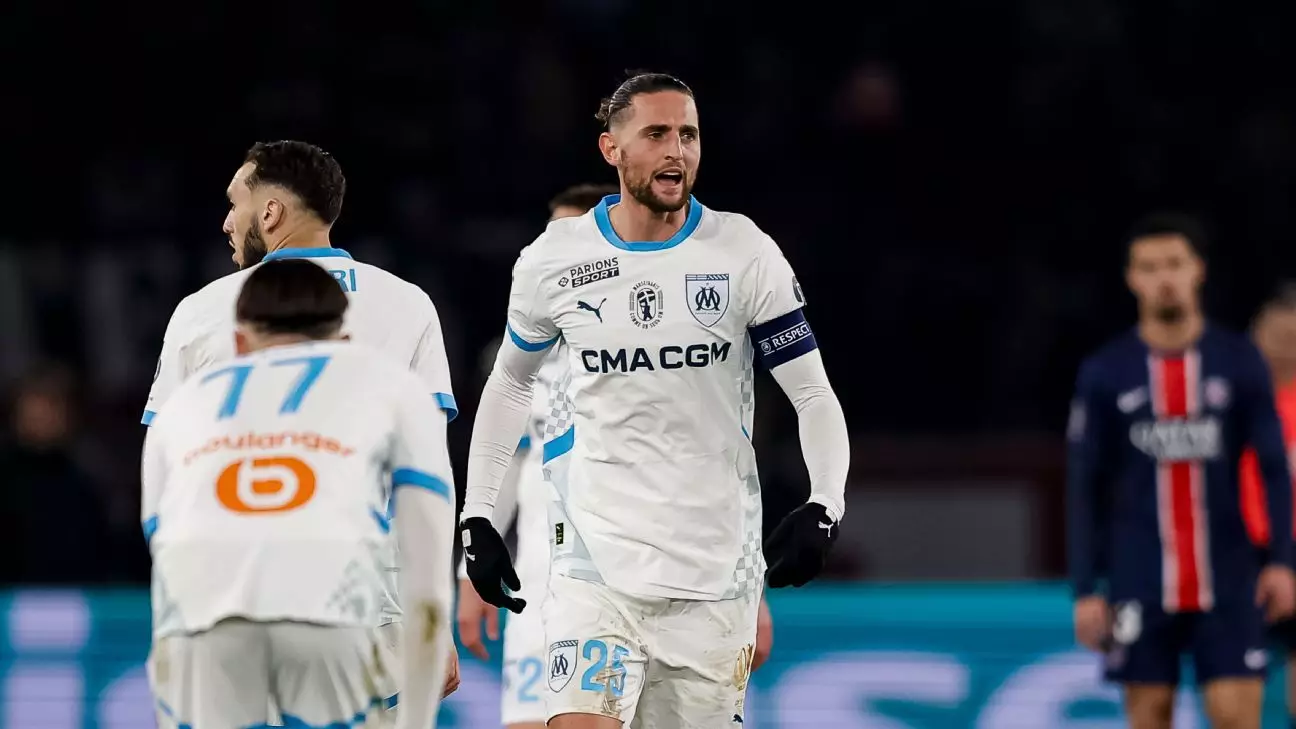In the world of football, rivalries are as old as the sport itself, but there comes a time when the passion that fuels these contests crosses the line into detrimental territories, as witnessed in the recent clash between Marseille and Paris Saint-Germain (PSG). The highly publicized match, where PSG emerged victorious with a 3-1 scoreline, spiraled into a scene marred by unacceptable fan behavior, prompting Adrien Rabiot, a former PSG player now thriving at Marseille, to confront the issue head-on through social media. “You can’t buy class,” he proclaimed, embedding a profound message that reflects not only his grievances but also the broader issues of respect and humanity within the sport.
Rabiot’s comments were framed against the backdrop of discriminatory chants and insults hurled by fans directed at both him and the Marseille team. This contemptuous display of poor sportsmanship raises questions about the moral obligations of clubs and their leadership, particularly when it involves incidents that reveal deep-rooted societal issues like racism and homophobia. Rabiot’s remarks point to a need for accountability and a cultural shift that prioritizes civility over conquest.
The Burden of Legacy and Identity
Rabiot’s journey from PSG to Marseille ignites a complex narrative about identity, loyalty, and the oft-delineated boundaries of professional sport. His decision to play for a club with such a fierce rivalry saw him labeled as a traitor by a segment of PSG supporters, revealing how deeply personal allegiances can dictate public sentiment in sports. However, as he spoke out against the hostility and lack of decorum echoing through the stands, he forced a dialogue around what it means to be a player in today’s football landscape—perhaps a more nuanced question that transcends allegiances and ventures into the ethical realm of sportsmanship.
The audible chants from fans, which derided not only rival players but also cast a shadow on the Marseille community, brought to the forefront the issue that these aren’t merely sporting chants—they represent a larger societal problem. The rhetoric used by fans, particularly the derogatory term “rats,” has racial overtones in French discourse and serves to isolate and belittle an entire demographic. This inflammatory language needs to be addressed decisively, as it perpetuates a cycle of division rather than promoting unity in sports.
The Role of Officials in Enforcing Respect
One of the glaring examples of negligence in responding to acts of discrimination was the failure of officials to halt play despite the ongoing insults. Referee Clément Turpin, deemed one of Europe’s top officials, was in a position to intervene but chose not to. This circumstantial oversight only emboldens harmful behaviors, suggesting that if punitive measures aren’t enforced, the culture of intolerance may very well fester. The incident highlights a cynical reality where the adherence to rules is inconsistent—some matches see swift action from referees in response to foul language, while others are neglected.
The football governing bodies in France have initiated measures aimed at curtailing this deeply ingrained hostility, yet these efforts have been met with mixed responses. The call to action from groups like Rouge Direct illustrates a communal effort to advocate for change at an institutional level, urging authorities to take these violations more seriously. As seen previously when parts of the Parc des Princes were closed due to similar incidents, consistency in punishment is paramount in setting a precedent where respect replaces vitriol.
Fans, Responsibility, and the Future of Football Culture
The involvement of passionate supporters is an integral part of the football ecosystem. However, with that passion comes an inherent responsibility to foster a positive environment that champions diversity rather than dehumanization. Both PSG and Marseille fans have a legacy that extends beyond the pitch; they have the opportunity to mold cultural perceptions and influence future generations. Addressing such grievances should not be relegated to mere post-match reflections but should be an active aspect of their identity moving forward.
Football, often referred to as the beautiful game, can serve as a platform for unity, inclusivity, and respect. But it requires a conscious commitment from players, officials, and fans alike to ensure that the energy of rivalry is harnessed towards creating competitive yet respectful atmospheres. Rabiot’s bold stance against the degradation witnessed on Sunday stands as a clarion call that echoes through the annals of sports—a reminder that class and dignity are integral elements of victory, far surpassing any trophy earned in a contest bereft of moral ground.


Leave a Reply